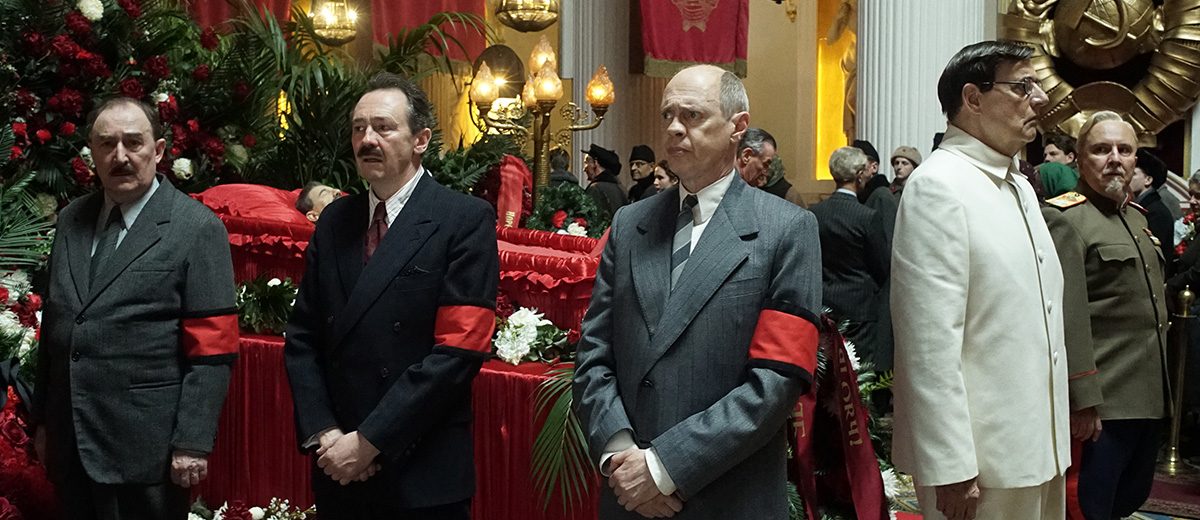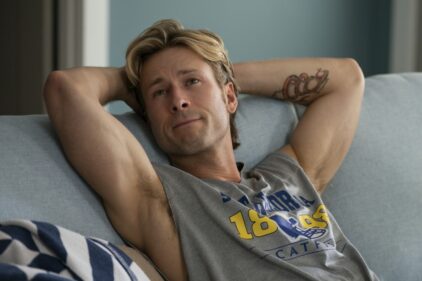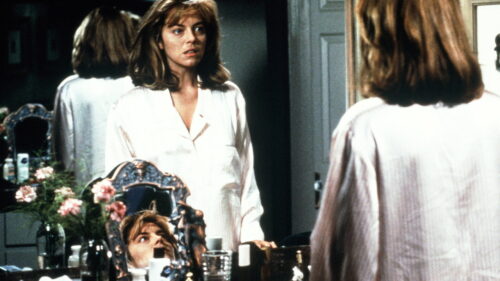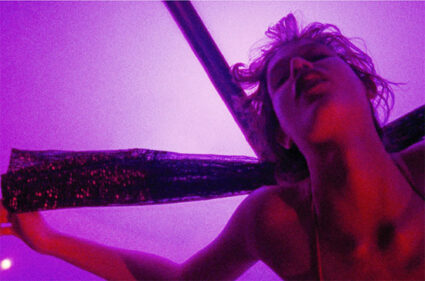“The Death of Stalin” is the best thing that Armando Iannucci has ever done: a hilarious film about a subject that’s not funny at all. The script, cowritten by Iannucci with David Schneider, Ian Martin and Peter Fellows, doesn’t so much joke about dictatorship as find the very existence of authoritarianism to be one of humanity’s sickest, saddest, oldest jokes—a fine distinction, but an important one, because it prevents the film from feeling exploitative, instead lending it the feeling of a lament in which the storyteller laughs so that he won’t cry.
Set immediately before and after the death of Soviet premier Josef Stalin (Adrian McLoughlin), the story begins in Moscow in 1953, with our glorious-but-soon-to-be-not-breathing leader signing off on executions, forcing his staff to watch John Wayne-John Ford movies with him, and calling up a radio station during a live, unrecorded performance of a symphony and demanding a recording. (The latter necessitates a spontaneous second performance, recorded this time; it’s led by a conductor who was rousted from his sleep and is still wearing his bedtime clothes.) The Kremlin is depicted here as a cult of personality, largely indifferent to the ideals the nation was theoretically founded on, and held together by arbitrary decrees, lots of guns, and a vast network of citizens who fear death, torture and imprisonment enough to rat out their neighbors whenever men in uniforms come calling. The cunning deployment of terror and violence makes powerful men out of mediocrities. The minute Stalin’s body is discovered on the floor of his office—”lying in a puddle of indignity,” as an underling puts it; down but not yet entirely out—a power vacuum opens up, and everyone above a certain rank anoints themselves Stalin’s true heir and starts plotting to replace him.
As director, Iannucci plays ringmaster to a multinational cast of great character actors. He knows enough to modulate them for consistency’s sake while letting them bring their own odd brilliance to whatever part they happen to fill. Steve Buscemi plays Stalin’s eventual successor, Nikita Khrushchev, as, basically, a smart Steve Buscemi character. He’s a laid-back tactician with better people skills than his rivals can recognize—somebody who understands weakness and error well enough to capitalize on them more swiftly and effectively than most. His main rival is Simon Russell Beale’s Laventri Beria, Stalin’s longest-lived secret police chief: the architect of the gulags, and a man who prides himself on personally torturing and murdering prisoners under his watch. This monster’s serene satisfaction would be unbearable if Iannucci didn’t treat him, Khrushchev and the rest as blatant ass-kissers, so transparent in their aims that they’ll literally race each other, on foot or in cars, to be the first to enter the orbit of those whose favor they seek.
Around these two strong if ridiculous leads, we have a flock of secondary characters with great faces, delivering one knockout line after another. Rupert Friend is Stalin’s idiot son, Vasily, who keeps barging into sensitive meetings and public gatherings shouting nonsense and profanity. Andrea Riseborough is Stalin’s daughter Svetlana, who recognizes the naked acquisitiveness of her father’s men but is mostly powerless to stop it. Michael Palin (welcome back!) is Vyacheslav Molotov, a former Stalin protege and the longtime minister of foreign affairs—a man who seems politically impotent but has some tricks up his sleeve. Jason Isaacs is Georgy Zhukov, a World War II hero and general who had fallen somewhat out of favor at the time of Stalin’s death, but entered the power struggle in a big way thanks to his understanding of Stalin as well as his own ruthlessness. He seems to be pulled into rooms by the momentum of his chin and chest. “I fucked Germany,” he says, sizing up his chances against Beria. “I think I can take a flesh lump in a fucking waistcoat.”
Jeffrey Tambor is Georgy Malenkov, the immediate successor to Stalin who was soon replaced by Khrushschev; he’s an intelligent but overly cautious man who lacks the brute instincts necessary to succeed his master. You can tell that he doesn’t have the right stuff when he’s getting his portrait taken, realizes he needs privacy for a conversation, and leaves the room himself rather than order everyone else out, as Stalin would have done. “Did Coco Chanel take a shit on your head?” Zhukov asks him, eyeballing his toupee. “No,” Malenov replies, “he did not.” A stealth candidate for breakout star (unexpectedly so, given the overwhelming maleness of this cast) is Olga Kurylenko’s Maria Yudina, the pianist introduced in the opening concert sequence; a Jewish woman mourning relatives killed under Stalin, she contrives to insert a scathing, handwritten note of protest into the record sleeve. Like Chekhov’s fabled gun, this proves to be significant later.
Contrary to movie tradition, the actors avoid generic “Russian” accents (only Kurylenko, a Ukranian, sounds like a stereotypical Hollywood Russian). They all act in their native voices, and deliver their lines not with the momentousness we’ve been conditioned to expect from Oscar-baiting period pieces, but with something more akin to the half-bored grousing, whining and muttering that we all practice in our own lives, often while suffering through meetings that no participant, our glorious leaders included, have any desire to attend. The consequences of Stalin’s high-handed but lowbrow leadership style become painfully clear once he’s found motionless in his office. His underlings know they’re required to take heroic measures to save him, but they have trouble locating even a mediocre doctor because their leader ordered most of them killed or sent to Siberia.
Anyone following the news coming out of the White House in 2018 couldn’t help but see the tiny-minded bully Donald Trump and his leaking, backbiting, constantly-fired-or-resigning staff reflected in this film, even though the “The Death of Stalin” was based on a graphic novel by Fabien Nurya and conceived long before the 2016 presidential election. Nearly every civilization has suffered through some version of this madness. Iannucci’s just here to skewer it, not in a lofty or smug way, but an earthy and immediate one, as if to remind us that yes, indeed, it can happen here, wherever “here” is. The end product joins an elite series of similarly blackhearted comedies about the reptilian impulses that drive men in power: “Dr. Strangelove,” “Apocalypse Now,” “Catch-22,” “M*A*S*H” and (lower mammal division) “Animal Farm.”
Iannucci is a specialist in political satire who’s been here, in one way or another, many times before, in “The Thick of It,” “In the Loop,” and “Veep”; but this movie is so much more ambitious, sophisticated and confident that it makes his earlier work feel like a warmup, because every choice by a politician or general is shown having immediate, often horrible physical consequences for some poor, unsuspecting schmuck, and because Iannucci has upped his game this time out, directing in a purposeful, at times expressive way rather than just using the camera to record actors talking to each other. My favorite flourish is the introductions: each new major character, invariably a small-minded and vicious person, is unveiled with a title card in a Scorsese-like, slow motion close-up, while performing some ordinary gesture or task. It’s the filmmaking equivalent of a toady lavishing praise on a social superior even though he’s done nothing of note.
The greed, desperation and narcissism driving every decision in this tale, however momentous or trivial, rings true to life even if you’ve never, say, tortured a political prisoner, or ordered the execution of someone you suspected of plotting against you. The treachery is usually couched in terms of ideology or selfless public service, but of course it’s all a power grab of some kind, and the longer the movie goes on, the more coldly hilarious Iannucci’s stylish deadpan becomes, until, by the end, things take a turn for the gruesomely surreal, and we feel as if we’re watching the cheekiest horror film never made. That the major events depicted here actually happened makes “Death of Stalin” even more unsettling. Yes, people were this ruthless and trivial. Yes, millions died for one man’s ego and pleasure, and after he keeled over and wet himself, his inner circle scrambled to occupy his chair. This is what dictatorship looks like.












